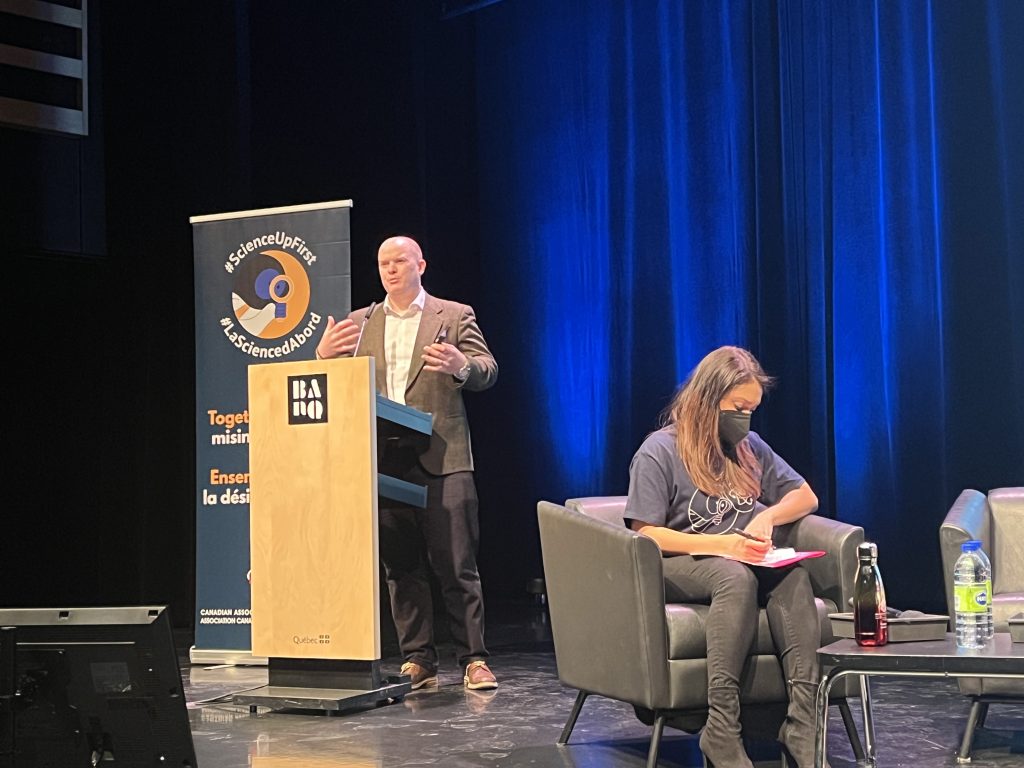Canadian researchers aim to uncover misinformation on social media and how to curb it
Posted February 2, 2023 4:47 pm.
Last Updated February 2, 2023 6:39 pm.
Misinformation has been a prevalent issue on social media, especially during the pandemic.
“People were clawing for information, they wanted something, they needed something to believe in and rely on,” said Emma Quinn, a M.Sc. student in Occupational and Environmental Hygiene at the University of British Columbia. “And if the only thing available to them was something either an extended truth or something that was untrue, they might be more likely to believe in and just to have something to something to believe in.”
Canadian scientists, researchers, and science communicators came together at Montreal’s Grande Bibliothèque Thursday, as part of ScienceUpFirst’s ‘Fighting information in 2023’ event to present their findings on misinformation and how to curb it.

(Photo Credit: Diona Macalinga/CityNews)
“On social media, the algorithms tend to push like content with like content,” said Quinn, also a research assistant on the project. “So if someone is already engaging in some kind of misinformation or other conspiracy theories, they might be more likely to be exposed to this kind of misinformation.”
The project is led by Timothy Caulfield, a Canada research chair in health law and policy at the University of Alberta, and Dr. Cheryl Peters, a research scientist and professor at the University of Calgary, about the COVID-19 “infodemic.”
The study looked at 300 posts with hashtags like #governmentlies, #hoax and #masksdontwork and showed how ineffective Instagram’s fact-checking tool really is, as the majority contained false information.
“Of the 300 posts that we looked at in 2020, only one was flagged for misinformation by the following year, and approximately a third of them were removed,” said Quinn. “After that project, we actually did a follow up to see if the Fact Checker programs on Instagram were effectively removing this misinformation and unfortunately, where we were finding that a lot of it actually still remained on the platform.”
Escaping misinformation is not that simple. On top of algorithms, research also showed the use of targeted exploitative ads on social media users.
“When Ivermectin was kind of everywhere and we saw Ivermectin being advertised on Meta platforms, we see things about long COVID right now on the platforms, which is something we’re still fully understanding,” said Marco Zenone, a research associate at the Health Law Institute of the University of Alberta. “And there’s a lot of products that are supposed to kind of treat or help prevent COVID, which has very little to no efficacy for.”
According to a recent report released by the Council of Canadian Academies, 2,800 deaths could have been avoided in 2021 if not for the vaccine hesitancy caused by misinformation surrounding COVID-19.
RELATED:
“I think COVID has really shown us the impacts of misinformation,” Zenone said. “Misinformation has always been a problem, but I think COVID really put it into the public sphere of the kind of awareness of what can happen.”
So, how can people protect themselves from misinformation online?
“I would always encourage people to look at their local government websites and kind of get direction information directly from experts themselves or from your trusted public health officers,” said Zenone.
“A lot of social media platforms do have a fact checker program or third party involved, although as we saw in that study, it’s not as effective as one might hope,” said Quinn. “So more recently, you see a lot of posts that have kind of a little blurb at the bottom of a post suggesting that other COVID information from the World Health Organization would be useful to look at.
“And the more you know, the easier it will be to recognize misinformation.”



